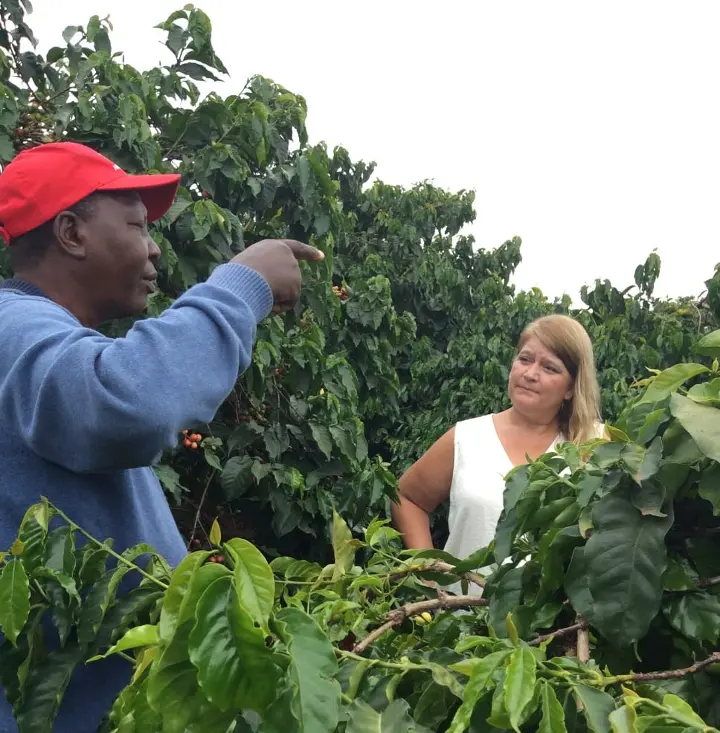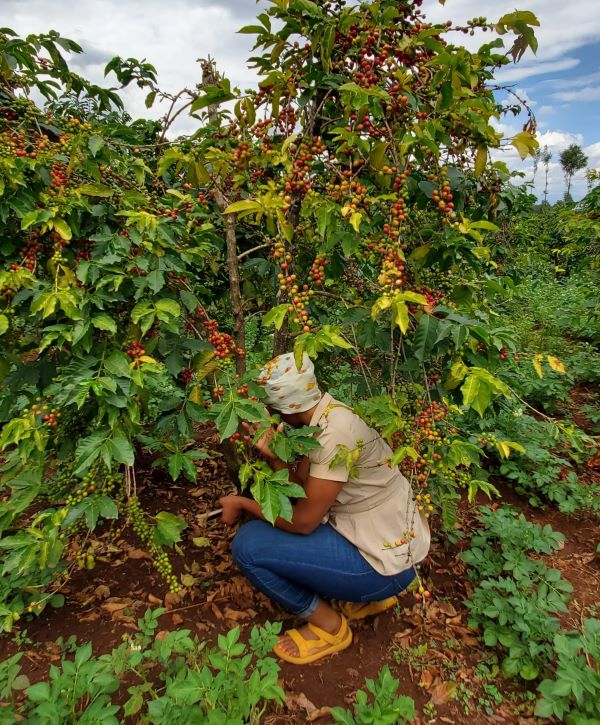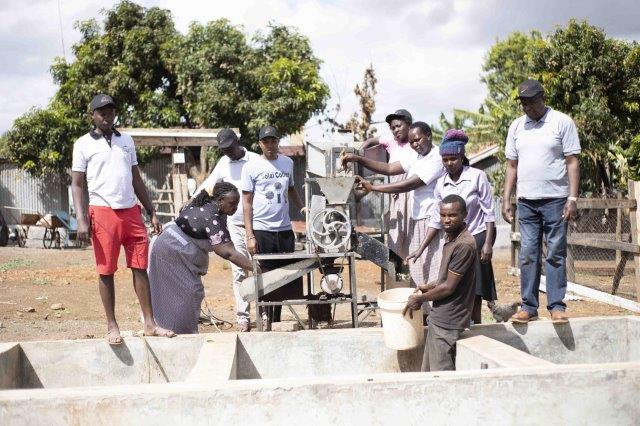The journey of coffee from bean to cup is labor-intensive and complex. With around 125 million people worldwide depending on coffee for their livelihoods and approximately 12.5 million farmers nurturing the beans from the ground up, coffee is one of the most valuable and widely exported agricultural products by developing countries.
However, despite being a thriving industry and a significant force in the global economy, coffee production is fraught with ethical dilemmas that threaten its integrity and sustainability. Kenyan coffee, recognized globally for its bold and bright flavors, is no exception. Like other coffee-growing regions, Kenya faces numerous ethical challenges that jeopardize the future of this vital industry.
To truly appreciate our morning cup of coffee, we must understand the challenges farmers face and the role intermediaries play in bringing coffee to our tables. In this blog, we explore four major ethical issues in the Kenyan coffee industry and how Solai Coffee is leading the way toward sustainability.

Fair Compensation for Farmers
Coffee farmers, mainly smallholders, often receive low prices for their crops, making it difficult to sustain their livelihoods. Market fluctuations and the influence of intermediaries further exacerbate this issue.
Solai Coffee's Co-founder Lameck Omariba recently highlighted the significant gap between what buyers are willing to pay and what farmers receive for their hard work.
"Addressing these challenges is crucial to ensure a sustainable future for the coffee industry and the communities that rely on it. We foster transparency, equity, and accountability across all value chain phases, protecting farmers from financial exploitation."
Several initiatives work to support farmers directly in promoting fairness and sustainability in the coffee industry. These programs aim to ensure farmers are compensated fairly and benefit from equitable trading practices.
- Fair Trade Certification: Programs like Fairtrade International and Fair Trade USA set minimum price guarantees and offer premiums directly to farmers, ensuring they receive a fair price regardless of market conditions.
- Direct Trade Practices: Farm-direct solutions, such as those employed by Solai Coffee, establish a direct and profitable relationship between farmers and buyers, bypassing intermediaries and allowing farmers to receive a larger share of the sale price. This program eradicates social injustices that threaten the sustainability of the coffee industry.
Support Ethical Coffee: Choose Solai Coffee and make a difference with every cup. Your purchase ensures fair compensation for farmers and supports ethical coffee practices.
Environmental Impact and Sustainable Coffee Farming
Climate change and sustainability are critical ethical issues that bring uncertainty to the future of coffee production. Coffee farming can lead to deforestation, loss of biodiversity, and soil degradation. Using chemical fertilizers and pesticides further harms the environment and local communities. Studies reveal that the bean belt will shrink by about 50% by 2050, and wild coffee in the global zone conducive to coffee growth will face extinction.
Bold actions are needed to reduce or minimize the carbon footprint across multiple sectors of the global economy.
- Consumer Responsibility: Coffee consumers can drive sustainability by seeking out information about the origins of their beans, how producers implement sustainable solutions, and whether farmers receive fair returns. This knowledge can shape buying behavior and build a community aligned with ethical standards.
- Sustainable Farming Practices: Techniques such as agroforestry, organic farming, and shade-grown coffee maintain biodiversity, protect soil health, and reduce chemical use, supporting sustainable coffee production.
- Environmental Certifications: Certifications like Rainforest Alliance and USDA Organic promote environmentally friendly farming practices that minimize negative impacts on the ecosystem, ensuring minimal ecological harm during coffee production.
- Climate Resilience Programs: Initiatives like World Coffee Research (WSR) focus on developing coffee varieties that are more resistant to climate change, helping farmers adapt to changing conditions while protecting the environment.
While certifications build confidence in the coffee buyers to trust that the producers are using ethical processes to farm coffee, they can be pricey and unfordable to most farmers, mainly small-scale farmers. Solai Coffee chooses to build relationships of trust with the farmers and work hand in hand with them.
Gender Equality in Coffee Farming
The issue of gender inequality in coffee farming dates back to when Scottish missionaries introduced coffee to the Kenyan highlands. Historically, coffee production has been male-dominated, with women providing labor and occupying non-managerial roles.
Women perform 70% of the labor in coffee production. Despite their invaluable contribution, the industry frequently overlooks them for management and leadership roles.
 /
/
Several programs and initiatives focus on supporting and empowering those involved in the coffee industry to address these challenges:
- Empowerment Programs: Initiatives like International Women's Coffee Alliance (IWCA) focus on empowering women through education, training, and leadership development, ensuring they have equal opportunities to succeed.
- Inclusive Cooperatives: Encouraging women to participate in farmer cooperatives and leadership roles ensures they have a voice and their contributions gain recognition.
- Gender-Sensitive Training: Providing tailored training and resources to address the specific needs and challenges women face in coffee farming helps to close the gender gap.
Workers' Rights and Social Sustainability
Inadequate infrastructure and extreme poverty are common in coffee-growing countries. Coffee farm workers often face poor working conditions, low wages, and a lack of access to basic rights like healthcare, education, and safe housing. Child labor is also a concern in some regions.
Do you know that about 2 million children worldwide provide the labor required for coffee production yearly?
Child labor, especially in agriculture, manufacturing, and mining, continues to be a significant problem. The coffee, cocoa, and textile industries are notorious for exploiting child labor, often due to poverty, lack of education, and weak labor laws enforcement. Families in poverty may rely on their children working to meet basic needs, leading to increased vulnerability to exploitation.
True sustainability in the coffee industry encompasses environmental stewardship and coffee-growing communities' social and economic well-being. Ideally, this means improved education, healthcare, and housing for those involved in coffee production.

- Long-Term Partnerships: Building long-term relationships between coffee buyers and producers is about more than just business. It's about commitment. It ensures stable incomes for farmers and supports community development over time. It's a promise that we are in this together, for the long haul, making a difference in the lives of those who bring us our daily cup of coffee.
Visit Impact page
- Ethical Certifications: Certifications like Fair Trade ensure that coffee production respects workers' rights, including fair wages, safe working environments, and the prohibition of child labor.
- Socially Responsible Business Practices: Coffee companies prioritizing social sustainability invest in the well-being of the communities they source from, ensuring that their business practices contribute positively to the local economy and society.
- International Laws and Conventions: International efforts like the United Nations Convention on the Rights of the Child (UNCRC) and the International Labour Organization (ILO) conventions aim to protect children from exploitation.
Seeking social and economic sustainability information is an excellent first step for a coffee consumer. Using that information to inform your buying choices is an even better way of protecting the future of the bean. By addressing social and ethical issues, the coffee industry moves towards a more ethical and sustainable future, benefiting farmers, workers, and the environment while providing consumers with coffee that aligns with their values.
Be part of the change. Purchase your next bag of coffee from Solai Coffee and help create a better future for coffee farmers and their communities.
Four Major Social and Ethical Issues in Coffee Production